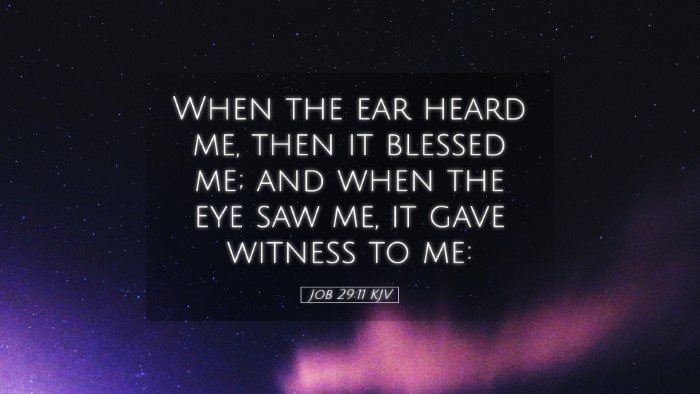Old Testament
Genesis Exodus Leviticus Numbers Deuteronomy Joshua Judges Ruth 1 Samuel 2 Samuel 1 Kings 2 Kings 1 Chronicles 2 Chronicles Ezra Nehemiah Esther Job Psalms Proverbs Ecclesiastes Song of Solomon Isaiah Jeremiah Lamentations Ezekiel Daniel Hosea Joel Amos Obadiah Jonah Micah Nahum Habakkuk Zephaniah Haggai Zechariah MalachiJob 29:11
Job 29:11 KJV
When the ear heard me, then it blessed me; and when the eye saw me, it gave witness to me:
Job 29:11 Bible Commentary
Commentary on Job 29:11
Scripture: Job 29:11 - "When the ear heard me, then it blessed me; and when the eye saw me, it gave witness to me."
Introduction
This verse from the Book of Job encapsulates the essence of Job's reflection upon his former life of honor and respect within the community. Job is reminiscing about a time when his presence was not only acknowledged but celebrated. This verse is rich with themes of testimony, community validation, and the profound sense of loss that Job experienced as his fortunes turned. The insights from public domain commentaries provide a multifaceted understanding of this verse's depth.
Insights from Matthew Henry
Respect and Influence: Matthew Henry notes that Job, in his days of prosperity, was esteemed highly by those around him. He had a status that commanded respect, and his words were impactful. When people heard Job speak, they were inclined to bless him, indicating that his counsel was wise and beneficial.
The Role of Community: Henry emphasizes the importance of community in the life of a believer. The acknowledgment from both the ear and the eye suggests that Job's life was open to scrutiny, yet it stood as a testament to righteousness. His life’s reflection brought blessings not only to himself but also to others, indicating how one's integrity can influence their environment.
Testimony of a Righteous Life: Job points out that both auditory and visual witnesses acknowledged his character. This serves as a reminder of the powerful testimony that a righteous life can bear in the eyes of others, demonstrating God's grace in action.
Insights from Albert Barnes
Societal Validation: Albert Barnes explicates the notion that Job's stature in society meant that he was not only recognized for his wisdom but also for his moral standing. People were eager to support and validate him, highlighting a deep cultural appreciation for justice and integrity.
Witnessing in Community: According to Barnes, there is a profound significance in the dualities presented: the ear and the eye. They symbolize how both the depth of speech and the observance of action can lead to a true understanding of one's character. This dual affirmation of Job’s life points to the holistic view of integrity – it must extend beyond mere words into action.
Reflection on Loss: Barnes reflects on the poignant contrast between Job’s past esteem and his current state of suffering. The previous blessings he received from the community now serve as a backdrop for his current afflictions, presenting a deeper message about the nature of human experience and the fleeting nature of worldly admiration.
Insights from Adam Clarke
Emphasis on Testimony: Adam Clarke gives great attention to the testimony surrounding Job, asserting that a well-lived life results in joy not only for the individual but also for the community surrounding them. Clarke notes that Job’s situation shows how the fruits of one’s labor and righteousness can lead to a positive societal impact.
The Role of Observance: Clarke accentuates that the acknowledgment from the ear and the eye serves as a reminder that actions often speak louder than words. A community’s blessing is not just an empty sentiment; it is rooted in the realities of what they have observed one’s life to be. Job’s integrity captivated those around him.
Contrast of Circumstances: Clarke draws attention to the stark contrast between Job’s past prestige and his current suffering. This provides a theological lens through which to understand suffering as a test of faith, standing as part of the greater narrative of God's sovereign purpose in the life of His followers.
Theological Reflections
Testimony of a Righteous Life: This verse serves as a significant reminder to pastors and theologians about the power of a righteous testimony. Job’s recollection of how he was once blessed by others for his good deeds emphasizes that righteous living matters and has lasting effects on those around us.
Community and Isolation: The reflections on Job’s earlier life invite readers to consider how they navigate their community dynamics. In moments of suffering, can one still maintain the testimony of a righteous life? This invites deeper theological inquiry into the nature of community, support, and the biblical call to carry one another’s burdens.
Impact of Speech and Actions: The interplay between what is heard and seen points to the integrity of one’s character, a theme central to Christian teachings. Leaders are called to model lives that reflect Christ, wherein our speech and actions are in harmony.
Application for Pastors and Students
Encouragement for the Afflicted: Job's situation encourages pastors and ministers to offer comfort to those in distress. Drawing on Job’s life can be a powerful illustration of hope and perseverance amidst suffering.
Integrity in Ministry: The significant lesson for students and aspiring leaders in ministry is to cultivate integrity in speech and conduct. The blessings Job received due to his uprightness serve as a model for the type of ministry that God honors and uses.
Understanding Suffering: The verse calls students and scholars to engage with the biblical theology of suffering - how it interacts with one’s past testimony and future hope. It serves as a catalyst for deeper exploration into the mysteries of faith amidst affliction.
Conclusion
Job 29:11 encapsulates the essence of a life well-lived, evaluated through the lens of community respect and personal integrity. The insights from renowned biblical commentators provide key principles for understanding not only Job's experiences but also their relevance to our lives today. For pastors, theologians, and students, this verse offers a rich tapestry for reflection and application in the pursuit of a faithful and impactful Christian life.


